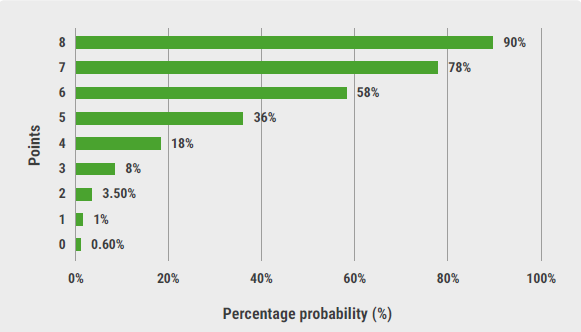"It is generally accepted that hydration is of outmost importance to prevent CA-AKI," Dr. Carlo Briguori of Mediterranea Cardiocentro, in Naples, Italy, told Reuters Health by email. "I am convinced that 'tailored-hydration regimens' will become a gold standard to prevent CA-AKI."
The recommended hydration regimen to prevent CA-AKI is normal saline infusion (1 mL/kg/h, reduced to half that for patients with left ventricular ejection fraction 35% or lower or NYHA functional class >II) from 12 hours before to 24 hours after contrast-media exposure.
UFR- and LVEDP-guided hydration have been proposed as tailored regimens to improve efficacy and reduce the risk of acute pulmonary edema, especially in high-risk patients.
Dr. Briguori and colleagues investigated whether UFR-guided hydration using the RenalGuard System from PLC Medical Systems is superior to LVEDP-guided hydration in their randomized, unblinded, phase-3 trial of patients at high risk for CA-AKI.
The primary endpoint, a composite of CA-AKI and acute pulmonary edema, occurred in 20 of 351 (5.7%) patients in the UFR-guided group versus 36 of 351 (10.3%) patients in the LVEDP-guided group, which represented a significant 44% reduction, the researchers report in JACC: Cardiovascular Interventions.
The number needed to treat to prevent one event with UFR-guided hydration was 22.
The risk of CA-AKI was 43% lower in the UFR-guided group (5.7%) than in the LVEDP-guided group (10.0%), while the risk of acute pulmonary edema was 93% lower in the UFR-guided group (0.3%) than in the LVEDP-guided group (2.0%), although the latter difference fell short of statistical significance.
The rate of in-hospital renal failure requiring dialysis was similar in the two groups, as was the length of hospital stay.
The rates of major adverse events and major adverse kidney events at one month were significantly lower in the UFR-guided group, and the rate of progression of kidney disease was 46% lower with UFR-guided hydration (5.4%) than with LVEDP-guided hydration (10.0%).
"In practice, all patients with a glomerular-filtration rate (GFR) <45 and high CA-AKI risk according to a Mehran score >11 or Gurm score >7 should be protected by the RenalGuard system," Dr. Briguori said.
He added, "I hope that physicians will give more and more attention to the risk of CA-AKI. Only by the identification of patients at risk can we limit this complication."
In a linked editorial, Dr. Lorenzo Azzalini of Icahn School of Medicine at Mount Sinai, in New York City, and Dr. Francisco Moroni of Universita Vita-Salute San Raffaele, in Milan, Italy, pointed out several reasons why the RenalGuard system has not yet gained widespread acceptance in clinical practice.
First, they say, there can be delays related to inserting the Foley catheter, setting up the device, and waiting to obtain the target UFR before beginning the procedure.
Second, patients can experience discomfort and develop complications related to Foley catheter insertion.
Finally, RenalGuard requires dedicated equipment, and there have yet to be cost-effectiveness analyses comparing these hydration strategies.
Studies demonstrating improvements in "hard" clinical endpoints will be important for determining which approach to targeted hydration will prevail, the editorial concludes.
The study was supported by Guerbet, a company producing contrast agents. The authors report no conflicts of interest.
By Will Boggs MD
SOURCE: https://bit.ly/3bFy5jk and https://bit.ly/2RgdrNb JACC: Cardiovascular Interventions, online September 14, 2020.
Posted on
Previous Article
« Bristol Myers’ Opdivo with Exelixis drug cuts kidney cancer death risk -study Next Article
Liquid biopsy might help detect, manage liver cancer in the future »
« Bristol Myers’ Opdivo with Exelixis drug cuts kidney cancer death risk -study Next Article
Liquid biopsy might help detect, manage liver cancer in the future »
Related Articles

March 28, 2017
Letter from the Editor

© 2024 Medicom Medical Publishers. All rights reserved. Terms and Conditions | Privacy Policy
HEAD OFFICE
Laarderhoogtweg 25
1101 EB Amsterdam
The Netherlands
T: +31 85 4012 560
E: publishers@medicom-publishers.com

